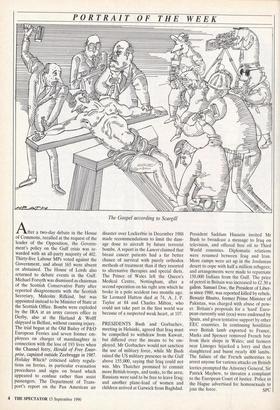PORTRAIT OF THE WEEK
The Gospel according to Scargill After a two-day debate in the House of Commons, recalled at the request of the leader of the Opposition, the Govern- ment's policy on the Gulf crisis was re- warded with an all-party majority of 402. Thirty-five Labour MPs voted against the Government, and about 165 were absent or abstained. The House of Lords also returned to debate events in the Gulf. Michael Forsyth was dismissed as chairman of the Scottish Conservative Party after reported disagreements with the Scottish Secretary, Malcolm Riflcind, but was appointed instead to be Minister of State at the Scottish Office. Bombs were exploded by the IRA at an army careers office in Derby, also at the Harland & Wolff shipyard in Belfast, without causing injury. The trial began at the Old Bailey of P&O European Ferries and seven former em- ployees on charges of manslaughter in connection with the loss of 193 lives when the Channel ferry, Herald of Free Enter- prise, capsized outside Zeebrugge in 1987. Holiday Which? criticised safety regula- tions on ferries, in particular evacuation procedures and signs on board which appeared to confuse rather than assist passengers. The Department of Trans- port's report on the Pan American air disaster over Lockerbie in December 1988 made recommendations to limit the dam- age done to aircraft by future terrorist bombs. A report in the Lancet claimed that breast cancer patients had a far better chance of survival with purely orthodox methods of treatment than if they resorted to alternative therapies and special diets. The Prince of Wales left the Queen's Medical Centre, Nottingham, after a second operation on his right arm which he broke in a polo accident two months ago. Sir Leonard Hutton died at 74, A. J. P. Taylor at 84 and Charles Milton, who could not take part in the first world war because of a suspected weak heart, at 107.
PRESIDENTS Bush and Gorbachev, meeting in Helsinki, agreed that Iraq must be compelled to withdraw from Kuwait, but differed over the means to be em- ployed. Mr Gorbachev would not sanction the use of military force, while Mr Bush raised the US military presence in the Gulf above 155,000, saying that Iraq could not win. Mrs Thatcher promised to commit more British troops, and tanks, to the area; Russians were said to be free to leave Iraq; and another plane-load of women and children arrived at Gatwick from Baghdad. President Saddam Hussein invited Mr Bush to broadcast a message to Iraq on television, and offered free oil to Third World countries. Diplomatic relations were resumed between Iraq and Iran. More camps were set up in the Jordanian desert to cope with half a million refugees; and arrangements were made to repatriate 150,000 Indians from the Gulf. The price of petrol in Britain was increased to £2.30 a gallon. Samuel Doe, the President of Liber- ia since 1980, was reported killed by rebels. Benazir Bhutto, former Prime Minister of Pakistan, was charged with abuse of pow- er. Britain's proposals for a 'hard' Euro- pean currently unit (ecu) were endorsed by Spain, and given tentative support by other EEC countries. In continuing hostilities over British lamb exported to France, Marks and Spencer removed French brie from their shops in Wales; and farmers near Limoges hijacked a lorry and then slaughtered and burnt nearly 400 lambs. The failure of the French authorities to arrest anyone for various attacks on British lorries prompted the Attorney General, Sir Patrick Mayhew, to threaten a complaint to the European Court of Justice. Police in the Hague advertised for homosexuals to


























































 Previous page
Previous page